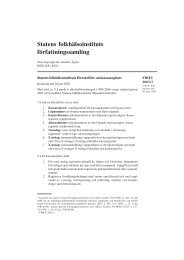Skydd mot smittspridning. Kunskapsunderlag för Folkhälsopolitisk ...
Skydd mot smittspridning. Kunskapsunderlag för Folkhälsopolitisk ...
Skydd mot smittspridning. Kunskapsunderlag för Folkhälsopolitisk ...
You also want an ePaper? Increase the reach of your titles
YUMPU automatically turns print PDFs into web optimized ePapers that Google loves.
This development, combined with the limited development of new antibiotics in<br />
recent decades, makes the situation in Sweden alarming.<br />
Regarding the occurrence of immunity, the overall vaccination coverage against<br />
measles, mumps and rubella has increased since Public Health Policy Report 2005.<br />
The vaccination coverage for these diseases lies above the critical threshold for herd<br />
immunity with a margin. At the same time, studies show reduced protection against<br />
rubella in pregnant women. Sexually transmitted diseases like HIV and chlamydia<br />
are increasing, but there is no clear trend for acute hepatitis B. The majority of<br />
newly reported HIV infections still involve immigrants, who have been infected<br />
before arrival to Sweden. The endemic increase in HIV infections is primarily occurring<br />
among homosexual men, but the number of infections among heterosexuals is<br />
also increasing. Several larger outbreaks of HIV have also occurred among injecting<br />
drug users since Public Health Policy Report 2005. This, together with outbreaks of<br />
hepatitis B among injecting drug users in recent years, shows the risk of infection in<br />
this group, despite recommendations for vaccination. The statistics on HIV infection<br />
are uncertain.<br />
The goal of the Swedish National Public Health Policy is to create societal conditions<br />
to ensure good health on equal terms for the entire population. But the<br />
national statistics on the infectious diseases continuously surveyed through statutory<br />
notifications under the Communicable Diseases Act do not provide access data<br />
on education, income and country of birth. Consequently, we lack national data to<br />
analyse socioeconomic differences in this objective domain. Literature reviews about<br />
infectious diseases in Europe show that infectious diseases such as HIV are distributed<br />
differently among different socioeconomic groups, just like chronic diseases.<br />
Furthermore, studies show that preventive strategies that are specifically adapted to<br />
the targeted socioeconomic group are more effective. Accordingly, it would be reasonable<br />
to find out how antibiotic resistance, vaccinations, and infectious agents are<br />
distributed nationally in different socioeconomic groups and depending on country<br />
of birth.<br />
Today, it is scientifically well recognised that the use of antibiotics affects the<br />
development of antibiotic resistance. It is therefore important that future measures<br />
for the prevention of antibiotic resistance focus on interventions that will lead to the<br />
rational use of antibiotics. In the work to counteract the development of antibiotic<br />
resistance, there is a need for continued vigorous measures to strengthen prevention<br />
and the hygienic work in healthcare. There is also an urgent need to develop alternative<br />
treatment therapies and new antibiotics.<br />
With regard to the occurrence of immunity, the overview of the measures implemented<br />
shows that the monitoring and evaluation systems for vaccination are not<br />
sufficient for today’s demands. The current manual system involves a significant<br />
amount of administrative work and new types of vaccine require other forms of<br />
continuous evaluation. Accordingly, there is a need to strengthen the monitoring<br />
systems for vaccines. Measures that will strengthen and improve the early detection<br />
10 M å l o M r å d e 7 – S K Y d d M o T S M I T T S P r I d n I n G

















